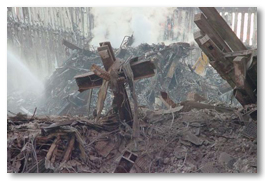Seven Years Later
- FATHER RAYMOND J. DE SOUZA
The long, violent terror war in the Islamic world -- which killed hundreds of thousands in Algeria alone in the 1990s -- took on global dimensions on Sept. 11, 2001.
 |
The attacks on New York -- the unofficial capital of the world -- and Washington, D.C., the American capital city, meant that the rise of Islamic extremism could no longer be considered a problem only for the Muslim world. The subsequent bombings in Bali, Madrid and London demonstrated that the whole world would be engaged in this battle, whether it wanted to be or not.
Two years ago, on the fifth anniversary of 9/11, I wrote that a certain weariness had developed in regard to the struggle against Islamist terror. There was a sense that the “war on terror” was not going well, and was perhaps making things worse. The growing consensus in the fall of 2006 was that Islamist violence and terror were here to stay, and that we would just have to live with it.
More dispiriting was that five years after 9/11, the essentially religious dimension of Islamic jihadism had yet to be fully engaged. False religious ideas can only be defeated by true religious ideas. Non-religious or anti-religious ideas are of little use in combating religious extremism.
The situation improved remarkably the day after the fifth anniversary. On Sept. 12, 2006, Pope Benedict XVI gave his famous lecture at Regensburg, directly raising the question of the link between Islam and violence. Benedict put the question: Does an Islamic conception of a God beyond all reason mean that He can command things contrary to reason, namely, using violence in the service of faith? Or is that not the faith of Islam, but a perversion of it?
In the subsequent days, many thought Benedict had made a grievous mistake as Islamist mobs set off a global anti-Christian riot. But in identifying the critical question, Benedict provoked a more thoughtful reaction in the Islamic world too. The result is that seven years after 9/11, the situation looks vastly better than it did five years on.
The task of developing a theological rejection of religious violence is one for Muslims to take on for themselves, within the tradition of Islamic theology. There are promising signs of preliminary steps in that direction. In a direct response to Regensburg, over a hundred Islamic scholars around the world drafted an open letter to Benedict, saying that there was no necessary link between Islam and violence, and that Islam was indeed a rational faith.
That response was a critical development. An international representation of Islamic authorities was rejecting the basic theological premise of the Islamist jihadis, i.e., that their terror could be a holy thing.
This November, a representative group of the open letter’s signatories will meet at the Vatican with Catholic representatives for a theological exchange on questions of faith, reason, liberty and violence. It is a Catholic-Islamic meeting without precedent in history.
Yet the objection could be made -- are these not just liberal Muslims without influence in jihadi circles? Will their meeting in Rome not just confirm the jihadi accusation that they have betrayed the authentic Islam that the jihadis are fighting to protect?
That objection will no doubt be raised, but it cannot be credibly made about King Fahd of Saudi Arabia, the custodian of the holy cities of Mecca and Medina. For most of the 9/11 period, the Saudi royal family was considered to be part of the problem, not the solution -- and for good reasons. Yet King Fahd has entered decisively the battle for the future of Islam. He made an exceptionally warm visit to Benedict at the Vatican. And then he announced that he would host an interreligious meeting to explore precisely the questions raised by Regensburg and its responses.
Given that such a meeting would be impossible in Saudi Arabia itself, he hosted it in Madrid at the Royal Palace just six weeks ago. It remains to be seen what will come of it, but the fact that the King of Saudi Arabia is willing to discuss theology with other religious leaders, paying particular attention to questions of pluralism, religious toleration and violence, is a major development.
The anniversaries of 9/11 remind us that this will be a long battle. This year, though, there are signs that the battle of religious ideas might be going better than we previously thought.
 This is Meaghen Gonzalez, Editor of CERC. I hope you appreciated this piece. We curate these articles especially for believers like you.
This is Meaghen Gonzalez, Editor of CERC. I hope you appreciated this piece. We curate these articles especially for believers like you.
Please show your appreciation by making a $3 donation. CERC is entirely reader supported.

Acknowledgement
Father Raymond J. de Souza. "Seven years later …" National Post, (Canada) September 11, 2008.
Reprinted with permission of the National Post and Fr. de Souza.
The Author
Father Raymond J. de Souza is the founding editor of Convivium magazine.
Copyright © 2008 National Post



